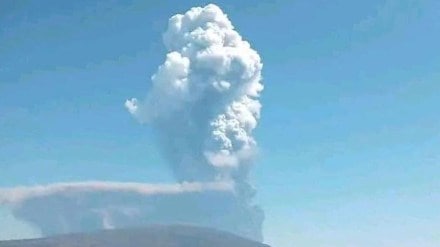A plume of volcanic ash from a rare eruption in northern Ethiopia reached Delhi around 11 pm on Monday, leaving a thin, hazy layer over parts of the city.
The ash cloud came from the Hayli Gubbi volcano, which erupted for the first time in thousands of years. Over the past 24 hours, it has drifted across the Red Sea and the Middle East, with meteorological agencies tracking its steady movement toward northwest India.
Will the ash plum affect Delhi’s air quality?
According to IndiaMetSky Weather, the ash plume from the volcano is mostly made up of sulphur dioxide, with small to moderate amounts of volcanic ash. It is moving from the Oman-Arabian Sea region toward parts of north and central India.
The plume is not expected to change air quality levels on the ground in India, but it may increase sulphur dioxide (SO2) levels over the hills of Nepal, the Himalayas, and the nearby Terai region, as some of the ash could hit the mountains before moving toward China.
Update06:
The Ash plume mostly consists of Sulphur Dioxide with low to moderate concentrations of Volcanic Ash. Its now stretching from Oman-Arabian sea region into Plains of North & Central India. Its will not impact AQI levels but it will impact So2 level at #Hills of #Nepal,… https://t.co/f95r95mLMi pic.twitter.com/WQOOhKmyHM— IndiaMetSky Weather (@indiametsky) November 24, 2025
“This will not bring much impact at surface level as this plume is way up higher in the atmosphere (25,000-45,000 feet up and rising and drifting away) so there will not be any significant impact on AQI Levels at the surface across the entire Northern sector,” IndiaMetSky wrote on X (formerly Twitter).
“There is a panic seen among the masses regarding this phenomenon but it’s mostly indirect for us as only Skies will turn hazy and some dust/ash will precipitate,” it added.
Reiterating: This will not bring much impact at surface level as this plume is way up higher in the atmosphere (25,000-45,000 feet up and rising and drifting away) so there will not be any significant of a impact on AQI Levels at the surface across entire Northern sector. There… https://t.co/ESm1xzrJDb
— IndiaMetSky Weather (@indiametsky) November 24, 2025
For now, forecasters say a major spike in Delhi’s AQI from the plume alone is unlikely, but the situation will be closely monitored as it moves east.
AQI concerns in NCR
For now, forecasters say a major spike in Delhi’s AQI from the plume alone is unlikely, but the situation will be closely monitored overnight as it moves east.
Delhi and nearby cities were already struggling with severe pollution. Delhi’s AQI stood at 382. Ghaziabad recorded 396, Noida 397, Greater Noida 382, and Faridabad 232. According to the CPCB, an AQI above 400 is considered ‘severe.’
Flight operations affected
Officials said flights in and around Indian airspace are already feeling the impact, with more disruptions expected as the plume gets closer.
Several flights were cancelled on Monday because of volcanic ash. Airlines such as Akasa Air, IndiGo and KLM had to cancel some flights and airports were given advice to handle any disruptions.
The Directorate General of Civil Aviation (DGCA) told airlines to avoid areas with ash, change flight routes and fuel plans if needed and follow the latest warnings. Airlines must also report immediately if a plane encounters ash, including any engine issues or smoke or smell in the cabin.
If ash affects airport operations, the DGCA said operators must inspect runways, taxiways and aprons right away. Airports and airlines have been asked to keep monitoring the situation using satellite images and weather updates.
